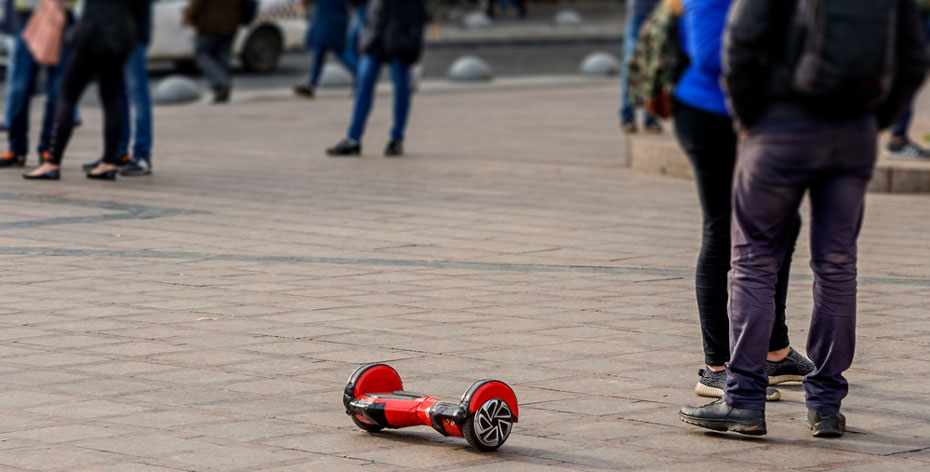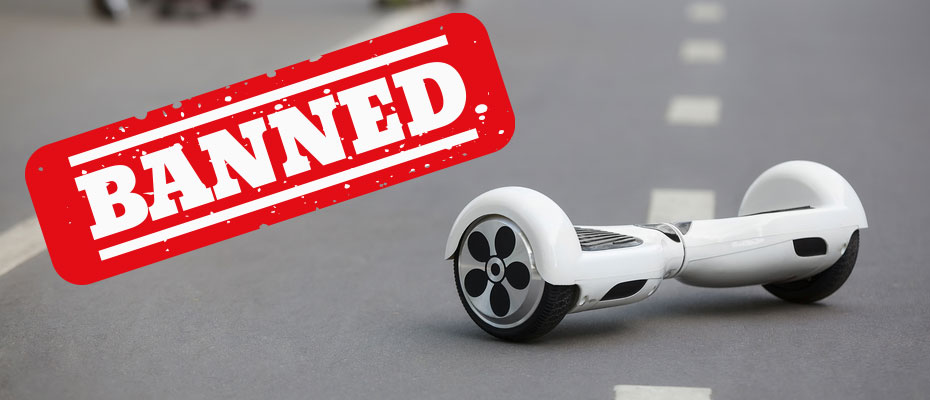Isn’t it strange? Although hoverboards have legal issues in our country, they’re still selling so well and are extremely popular right now? In this guide, we’ll look at the current laws and enforcement to do with these powered transporters and answer the question: are these hoverboards legal in the UK in 2022?
We’ll cover the current laws that affect hoverboards and go further into the ‘real’ situation and how seriously these laws are being taken ‘in the real world’. Are you going to get arrested for riding a hoverboard outdoors? What are the fines? Let’s get started.
What are the current UK laws on hoverboards?

English law is an odd mix of laws some of which date back hundreds of years. While there aren’t any specifically for hoverboards, there are different parts of British laws that do relate to them.
According to the official Gov.uk website, hoverboards fall under the laws covering all ‘powered transporters’. These cover a range of electric rides, including everything from electric scooters to powered skateboards, one-wheels and even e-skates.
Pretty much anything you can ride on, that has an electric motor will be covered by this.
As odd as it sounds, even children’s hoverboards are classed as motor vehicles and that means that they are subject to the same laws as proper vehicles. Here’s the legal bit, direct from the government website:
[quoteBox text=”It is illegal to use a powered transporter:
- on a public road without complying with a number of legal requirements, which potential users will find very difficult
- in spaces that are set aside for use by pedestrians, cyclists, and horse-riders; this includes on the pavement and in cycle lanes
Any person who uses a powered transporter on a public road or other prohibited space in breach of the law is committing a criminal offence and can be prosecuted.”]
Blimey, that sounds serious!
We’ll go into what the real situation is later in this article and find out if the police are pulling 6-year-olds over and dragging them out of the part ‘down to the nick’, so to speak.
Why are hoverboards considered a problem in public places legally?

If you’re wondering what the big deal with riding your shiny new hoverboard on the pavement is, that’s completely understandable. They’re not exactly the most dangerous vehicle out there. So what’s the issue here?
[infoBox text=”Officially, the main point of contention with any kind of electric ride is that they aren’t insured.”]
So, technically, if someone riding a hoverboard (or any powered electric ride) was to slam into a car, a pram, someone’s property, or a person, then there’d be no financial cover and the ‘crashed into’ party would be out of pocket.
OK, let’s brush the dust off some really old legal documents dating back over 100 years and look at some more of the law that affects hoverboards.
How a 180-year-old law affects where you can ride your hoverboard
One of the oldest laws affecting hoverboards dates back to the 1830s (when hoverboards must have been a real nuisance for people in the UK). Section 72 of the Highway act of 1835 is, bizarrely, still used in courts today. It actually makes for some entertaining reading, with even asses and mules making the list:
[quoteBox text=”If any person shall wilfully ride upon any footpath or causeway by the side of any road made or set apart for the use or accommodation of foot passengers; or shall wilfully lead or drive any horse, ass, sheep, mule, swine, or cattle or carriage of any description, or any truck or sledge, upon any such footpath or causeway; or shall tether any horse, ass, mule, swine, or cattle, on any highway, so as to suffer or permit the tethered animal to be thereon; Every person so offending in any of the cases aforesaid shall for each and every such offence forfeit and pay any sum not exceeding level 2 on the standard scale, over and above the damages occasioned thereby.”]
Clearly, this law could use updating to include some clarification about vehicles such as hoverboards and other e-rides. But this is at least some of the law that someone prosecuting a case against a hoverboard-rider would use.
So, are hoverboards completely banned in the UK?

No. Self-balancing rides are not illegal or banned in the UK. You can still buy them and ride them ‘legally’ in a number of places (mainly your home!). As we’ll find out later, the law isn’t exactly being enforced and we were unable to find any cases of someone being prosecuted).
Where does the law say you can use your hoverboard?
The current law also states that you are allowed to use your hoverboard:
- on private land with the permission of the land owner
So you can ride around your home, or your garden in the UK basically. Fine if you have either a) a mansion, b) a friend who owns ‘land’ or c) a huge backyard with plenty of space to ride around.
In all seriousness, if you absolutely plan to stick to the law with your new hoverboard, you can use it in your home, back yard or at the front of your house if you’ve got a drive or path on your property. It’s not a total write off for anyone with at least somewhere to ride.
Can you ride your hoverboard on cycle paths and bridleways?
According to current laws, you’re definitely not allowed to ride your hoverboard on pavements, in parks and in any outdoor public space. So what about lanes that are dedicated to this sort of thing, like cycle paths and bridleways?
You’d think those places were fine for hoverboards, right?
Sadly not.
The Highway Code rule 157 is there to step in and stop you from having any fun there. Here’s the bit of law that covers those kinds of paths.
[quoteBox text=”Certain motorised vehicles do not meet the construction and technical requirements for road vehicles and are generally not intended, not suitable and not legal for road, pavement, footpath, cycle path or bridleway use.
These include most types of miniature motorcycles, also called mini motos, and motorised scooters, also called go peds, which are powered by electric or internal combustion engines. These types of vehicle MUST NOT be used on roads, pavements, footpaths or bridleways.”]
This is especially odd as you can technically take a car on a bridleway, but a child can’t ride their hoverboard on one? I think I know which one is more dangerous.
Can children ride hoverboards in the park?

As the law stands in the UK, you are currently not allowed to ride a self-balancing hoverboard in a public park. This applies to children and adults alike. It also applies to hoverboards that have been turned into go-karts with conversion kits.
So, how come you see younger kids in the park riding around on hoverboards, especially with those cool ‘GoKart’ conversion kits, then? Aren’t they breaking the law?
Technically speaking, most hoverboards are perfectly well suited to the park, where they naturally form ideal paths for adults and children to ride on, often with smooth tarmac surfaces. But according to the law, this isn’t classed as private land and you’re not meant to ride hoverboards in public parks.
That seems even odder when you see scooters and bikes bombing around without any problems. Self-balancing scooters are classed as powered vehicles and it’s not currently legal to ride them in your local park.
Has anyone been prosecuted for riding hoverboards in the park?
It’s almost impossible to find any stories, examples or cases of either adults or parents of children being prosecuted for riding a hoverboard anywhere, let alone specifically in public parks.
Aside from a stern warning from 2015 from Warwickshire police about not riding your hoverboard on the pavement, it’s very hard to find anyone who has got into trouble with the old bill riding around on their hoverboards.
What happens if you get caught riding a hoverboard in the UK?
This all sounds very heavy and serious. And you might be wondering: aren’t hoverboards meant to be fun!? Here’s a shocking fact: Every one of us has broken the law at some point. There are countless laws that are never enforced. Did you know it’s technically illegal to be drunk in a pub?
There are plenty of really strange UK laws that exist but aren’t enforced.
So what happens if you decide to take your hoverboard out in the street, or on a path or into a park and you get stopped by the police? Will your hoverboard be confiscated and destroyed? Will you get slapped with a huge fine? Incarcerated for your evil deed?
By the book, there are a couple of things that can happen:
- You could be issued with a fixed penalty fine of between £300 and £500
- Your hoverboard could be seized.
However, as we mentioned earlier, you’ll have a hard time digging up any previous cases of this happening.
Conclusion: Where can I ride a hoverboard in the UK?
According to the UK laws at the time of writing, options are limited about where you can ride your hoverboard. Technically, you’re not allowed legally to ride on public paths, in your street, in parks or on cycle paths.
All that being said, these laws are generally being taken with a pinch of salt and it’s not easy to find cases in the news of anyone being prosecuted, fined or having their hoverboard seized by the police.
Realistically, they’ve got better things to do than chase kids out of the park or confiscate 6-year-old Timmy’s Christmas present. With growing pressure to find greener ways for us all to get around, hopefully there will be changes made to the law on where you can ride hoverboards soon.